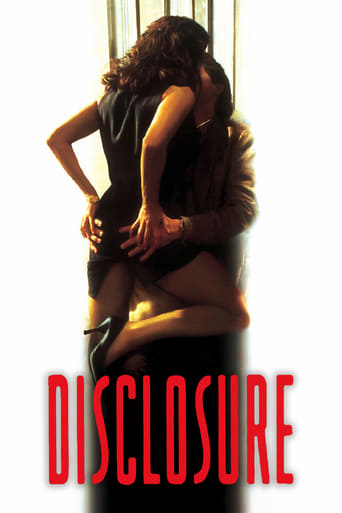Stometer
Save your money for something good and enjoyable
Gurlyndrobb
While it doesn't offer any answers, it both thrills and makes you think.
Teddie Blake
The movie turns out to be a little better than the average. Starting from a romantic formula often seen in the cinema, it ends in the most predictable (and somewhat bland) way.
Anoushka Slater
While it doesn't offer any answers, it both thrills and makes you think.
JohnHowardReid
Splendid acting from Michael Douglas, Demi Moore and Donald Sutherland save a somewhat complicated and rather computer-technical plot which doesn't make a great deal of sense if we examine it too closely. Another drawback lies in the TV-style direction by Barry Levinson, who was certainly an odd choice for director. The movie was obviously produced on a multi-million dollar budget -- thirty- two million if I remember correctly -- so why hand the reins to someone with a tunnel vision who sees everything in facial close- ups? Even minor characters who are on screen for only a minute or so get the full, stand-alone, close-up treatment. At the end of the day, we have so many unimportant faces that close-ups force us to remember that it's difficult to even keep track of the plot, let alone focus our attention on which characters are important in this never-ending parade of who the dickens is who! Even right at the very end of the movie we are still being urged via distracting close-ups to take special note of newly introduced characters who have virtually little or nothing to do with the plot whatever!
hall895
I suppose the idea of Michael Douglas being sexually harassed by Demi Moore could be intriguing. Could be. But in this movie it doesn't end up being intriguing at all. The story fizzles out before it ever really gets going. The movie goes on and on without ever really going anywhere. There's no spark, no sizzle. Attempts at humor fall horribly flat. The only laughs in this movie come from laughing at just how bad it is, most notably in the big climactic virtual reality scene. Wait, big climactic virtual reality scene? Yeah, it's just as stupid as it sounds, an awful idea executed so badly you can't help but laugh at how truly terrible it is. This is a movie which fails in pretty much every way possible.Douglas plays Tom Sanders, the head of production at some high-tech Seattle outfit. There's a big merger on the horizon, Tom expects a big promotion to go with it. But the job he covets goes to Meredith Johnson, a one-time girlfriend of his who celebrates their reunion by trying to rape him in her office. When Tom says no, not before having a little fun of course because the movie needs its obligatory sex scene, Meredith promises to ruin him. And the next day she duly accuses him of sexual harassment. He gets himself a lawyer, accuses her and it's a big he-said, she-said deal which only serves to bore those of us who are unfortunate enough to be watching. Drama and tension are in very short supply. Tedium is the order of the day. Moore's absolutely atrocious acting doesn't help matters. My goodness, she is terrible. The story slogs along, everyone ganging up on poor Tom in some horribly uninteresting conspiracy. It's not just Meredith out to get him, this goes all the way up to the big boss at the top. That character, played by Donald Sutherland, is I suppose meant to seem sinister but the way Sutherland mugs and overacts he just comes off as a buffoon. Just another example of the way this movie completely misses the mark. And just when you think it can't possibly get any worse along comes that absurd virtual reality scene which is simply one of the dumbest things ever seen in any movie. Even after that laughable "climax" the movie doesn't have the decency to just end. More pointless, boring twists to come. The whole thing is just interminable. Movies don't get much worse than this.
seymourblack-1
By the 1990s when an increasing number of women were filling top jobs in the corporate world, a story about a woman sexually harassing a man became a plausible scenario and the topical and controversial nature of the subject resonated strongly enough with the public at that time to make "Disclosure" a great box office success.Whilst the sexual harassment element of the story was shocking and attention grabbing, it soon became apparent that this was just part of a far larger and more pervasive issue i.e. the abuse of power. In the workplace, where social conventions, various legal constraints and political correctness all come into play, there is still no escape from the kind of management conspiracies, office politics and duplicity which are depicted so effectively in "Disclosure" or the kinds of distrust and paranoia that they can so easily generate.Tom Sanders (Michael Douglas) heads one of the divisions of a Seattle computer company and is engaged in the development of a product which is vitally important to the success of a planned and very lucrative merger with another company. There are some problems with the product which Tom and his team are currently dealing with and are under considerable pressure to resolve.As a result of some changes which are taking place within the company, Tom's confident that he'll be promoted but it soon transpires that he's been passed over and the job has been given to one of his ex-girlfriends, Meredith Johnson (Demi Moore). On her first day in the job, Meredith arranges a late meeting with Tom to discuss his division's work but during their meeting she aggressively tries to seduce him and is furious when, after a considerable struggle, she's unsuccessful.Meredith responds to Tom's rejection by accusing him of sexual harassment and asserting that in the circumstances, there's no way that she'd be able to work with him again. The company want to avoid any publicity that could have an adverse impact on the upcoming merger and so try to get Tom to take a transfer to another job in their Austin branch. He can't countenance this idea because of the negative effect it would have on his career and is in a very tight spot. Help unexpectedly arrives in the form of an anonymous e-mail which recommends that he consult an attorney called Catherine Alvarez (Roma Maffia) who's a specialist in sexual harassment cases.Tom decides to fight back and files a counter-suit. The process he has to go through to achieve justice is difficult and painful but irrefutable proof of his innocence is produced and the company agrees to retain him and give him a pay rise.The relief that Tom feels after being cleared of the charges against him is short lived as it quickly becomes apparent that efforts which were originally initiated by Meredith to make him look incompetent have now drawn wider support and he's being set up to be publicly humiliated and undermined at a high profile shareholders' meeting. The way in which Tom copes with this threat then provides the story with its intriguing conclusion.The events in "Disclosure" all take place within the space of one intense week in which Tom's normally affluent and comfortable lifestyle is disrupted as his disappointment at being passed over for promotion turns into discomfort when he discovers the identity of his new boss and then horror as he's threatened with the loss of his job, his wife, his family and his stock options.The false accusation made against him, the plots to make him look incompetent and a workplace where no one can be trusted, create a climate of paranoia which is reinforced when some of his previous innocent actions are characterised as something more sinister and the support of his colleagues is systematically eroded by those high up in the company structure.Michael Douglas gives a good solid performance as the beleaguered Tom and Demi Moore is marvellous as the cold and cruel villain of the piece. Donald Sutherland and Roma Maffia also stand out in their supporting roles.
capie4
I a twenty-year-old in the early '80's--and male, AND in the military, I suffered as much as any male in the corporate World regarding the sexism's against the male, the racism against the White, and especially the White-male. It was "open season" on especially White males who were especially disregarded in both being a victim and defense of sexual harassment and racism. This was due to the definition of sexual harassment which, unofficially, was defined as "thinking from behind your zipper---a definition (cleaned up a bit) common to men, for the purpose to "gain power over a person." At that time, changed since thanks to "Sex in the City", women were still seen as sluts and not sexually aggressive. Women, the whole time, were free to practice sexual harassment and discrimination (then called, "get even-ism") which developed as a practice of oversensitivity. The power for which women did (and do) as they practiced sexism was not thinking out of their zipper, but using oversensitivity to the defined sexism (which is sexist in its nature)as a tool to gain power over their environment. In short, women do not practice sexism to gain power over a person, but of an environment (which includes people--male and female). They will use oversensitivity to garner a complaint against a male competitor for a promotion, and the male had no defense as it was open season on him.This movie (book too?) had Demi Moore's character practicing sexism to gain power over a male competitor to gain power over him by actually using sex. This is not consistent with how women sexually harass. The writers had her using her vagina to gain power over a male, (not unbelievable today, thanks again, to the aforementioned Sex in the City) instead of practicing (and exposing to the public) the way a woman harasses and discriminates.Had she gone through the movie accusing every male of impropriety's, she would have been a normal "femi-nazi" sexist-believable and bared to the movie-going public--and exposing women's sexism (which is *still* not today in 2011) to the mainstream and opening doors for women to be included in the sexual harassment policies.As it stands, this movie does what corporations have done since the 1972 equal rights laws have been doing---leaving women out of guilt, and men being the target.This is what this movie fails to recognize.Demi Moore's character is sexually aggressive to gain power over a person--and not there environment.

